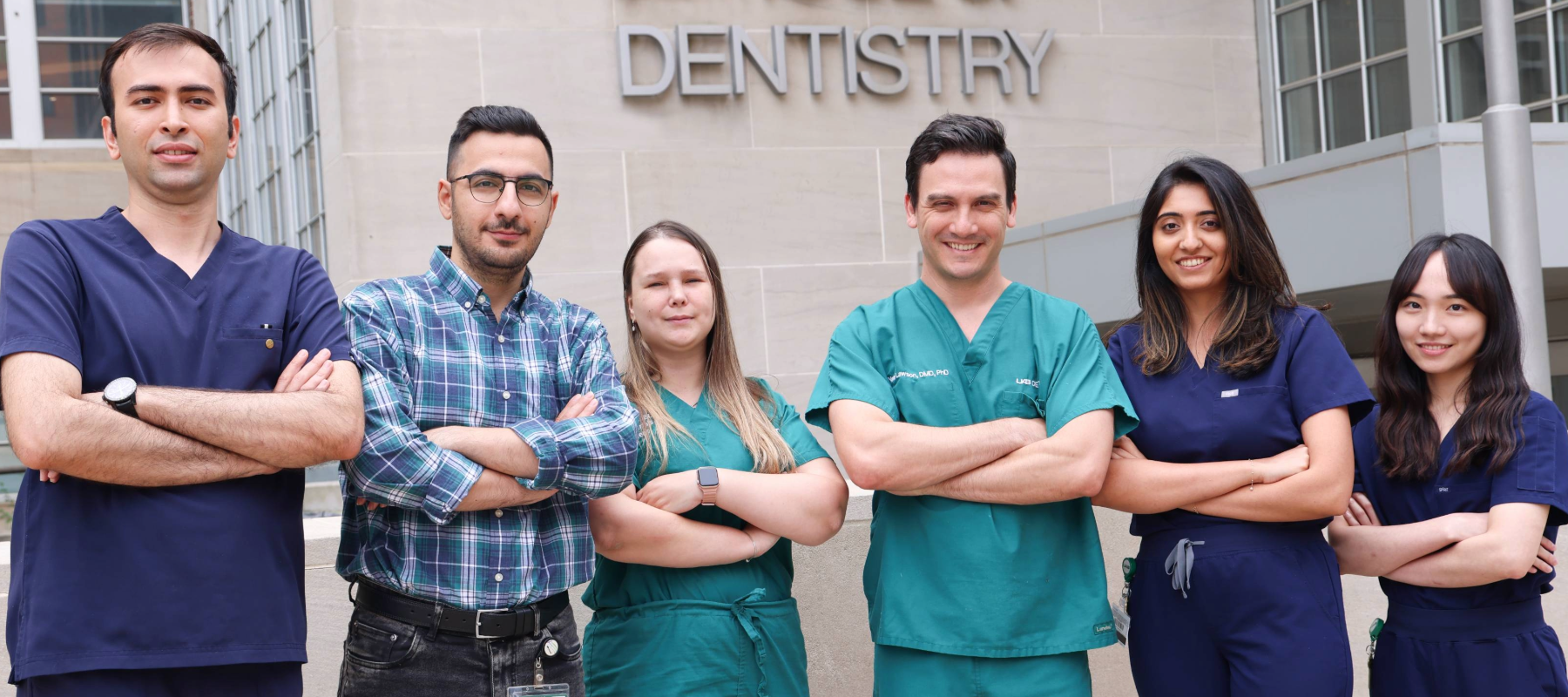M.S. Degree in Dentistry - Emphasis in Dental Biomaterials
Application Deadline
February 1
The Department of Clinical and Community Sciences offers graduate studies leading to a Master of Science degree with emphasis in Dental Biomaterials. We train students in clinically applied dental materials research through a blend of engaging coursework and hands-on laboratory experience. Our program is fully integrated within the dental school, so students collaborate regularly with faculty and residents across many different clinical departments. This two-year, immersive curriculum is designed to give you a head start on your professional goals while providing a nurturing, engaging, and enjoyable learning environment.
Laboratory Research
Students pursue research aligned with their interests and strengths. Thanks to the breadth of projects at UAB, you’ll gain exposure to a wide range of topics, working closely with departmental faculty to build laboratory skills and master core techniques. As you progress, you’ll select and complete a thesis project that showcases your independent research. The focus of the laboratory is related to materials used in adhesive dentistry, prosthodontics, and 3D printing.
Skills and Outcomes
Graduates leave the program:
- Fluent in current literature—in dental biomaterials, clinical restorative dentistry, and their chosen research area.
- Competent with ADA specifications and testing, able to plan and perform a variety of in vitro evaluations.
- Ready to design, implement, analyze, and report a research protocol in a publishable scientific paper.
Summary
Our goal is for every master’s student to graduate with substantial research experience, at least one publication, and a strong foundation in dental biomaterials. Alumni are well positioned for academic careers (U.S. or abroad), advanced clinical training, or industry roles.
Watch this video to meet Dr. Lawson and learn more
Additional Information
Program Director: Dr. Nathaniel Lawson
Length of Program: 2 years
Match Participant: No
Pass Participant: Yes
Degree Awarded: Master of Science (in Dentistry) AND Certificate in Biomaterials
TOEFL required: No
GRE required: No
Interview required: Yes, held online via Zoom
Stipend Available: No
Tuition/fees Approximately: $12, 482.00 per year plus 18 credit hours of Graduate School fees that are based on per credit hour
International Students Accepted: Yes
Application Deadline: February 1
Program Start Date: July 1
PASS Application Fee: $25 - Applicants must apply through the PASS application service, www.adea.org The applicant should email
Acceptance Deposit Fee
A $500 deposit is due upon acceptance to and is non-refundable. NOTE: Please pay this deposit ONLY when directed to do so by the School of Dentistry.
Questions?
Dr. Nathaniel Lawson
Associate Professor
Birmingham, AL 35294-2170
Telephone: (205) 975-8302
Email:
Core Courses
PG 760. Biomaterials Journal Club
This course will involve individual presentations from each resident of 1-2 current peer-reviewed articles related to dental materials. The course will teach the resident to generate a cohesive and effective presentation, learn current developments in multiple disciplines, critically evaluate current dental literature using an evidence based analysis of restorative techniques and materials, and be able to evaluate treatment outcomes and make a knowledgeable long-term patient prognosis based on clinical data.
PG 510. Introduction to Dental Materials Research
Provides students with foundational knowledge and practical skills for investigating dental materials through laboratory-based approaches. The course covers laboratory basics, pilot testing, protocol development, and the application of standards and engineering terminology, alongside a range of testing methods including mechanical, fatigue, bond strength, wear, hardness, and optical property evaluation. Students will learn about microscopy and profilometry for material characterization, understand and apply levels of evidence in research, and develop skills in scientific writing for papers and abstracts. By integrating technical competence with critical analysis, this course prepares students to contribute effectively to dental materials research and evidence-based practice.
PG 758. Clinically Applied Dental Materials
Introduces students to the clinically relevant properties, microstructure, and composition of contemporary dental materials, emphasizing how these characteristics influence their physical and mechanical performance in practice. Topics include advanced bonding techniques, composites, glass ionomer and bioactive materials, pulp capping agents, zirconia, CAD/CAM materials, resin cements, curing lights, impression and temporary materials. Through a combination of theory and clinical application, the course prepares students to select and utilize dental materials effectively in evidence-based patient care.
PG 797. Advanced Restorative Techniques
Focuses on contemporary approaches to the prevention and minimally invasive management of dental disease, with emphasis on both aesthetic and functional outcomes. Students will develop skills in managing anterior discolorations, performing high-quality anterior and posterior composite restorations, and treating deep caries with evidence-based protocols. The course covers the selection and application of ceramics, cementation and bonding techniques, and partial coverage restorations, while also introducing the use of advanced technologies such as clinical photography and 3D printing. Through a combination of theoretical knowledge and hands-on practice, students will refine their ability to plan and execute advanced restorative treatments.
CD 500. Statistics for Dental Research
Equips students with the statistical skills needed to analyze and interpret data in dental research. The course introduces Microsoft Excel for data management and advanced functions, alongside the fundamentals of statistical reasoning, including hypothesis testing, p-values, and t-tests. Students will learn methods for comparing multiple groups, performing post-hoc analyses, and applying non-parametric tests. The curriculum also covers power analysis, assumption testing, correlation, and regression techniques, with an introduction to SPSS for more complex analyses. Emphasis is placed on presenting results effectively for research publications and professional communication.
